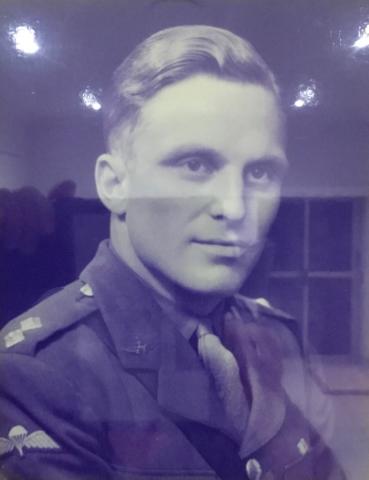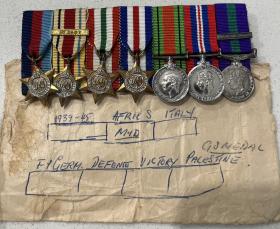Godfrey A Maguire (Mickey or Mick) was born on 2 March 1918. He was a Sergeant in the 1st Parachute Battalion and later a Lieutenant with the 12th Parachute Battalion from 1944. After the war, he left the Parachute Regiment and was a Captain with the Royal Fusiliers and the RAOC.
Mick’s father was Jack Maguire from Fremantle, Western Australia. Godfrey's son, Tim Maguire, offers this description of his grandfather:
"Until 20 years ago, I had no idea that I had convict ancestors from Western Australia, which is rare. Anyway, my Grandfather was one Jack Maguire from Fremantle WA. He volunteered for the 51st battalion and ended up getting wounded at Polygon Wood [a battle that took place during WW1] in the hip and wrist, apparently. He met my Grandmother who was a nurse and they married. Still suffering from his wounds, he caught the Spanish flu and for some reason , returned to Fremantle, sans wife and child where he fizzled out and died a lonely death in 1933 at the age of 31.
My Grandmother remarried a man called Cooper and settled in Robert de Bruce’s origin village of Writtle, Essex".
Mick himself grew up in England and, according to Tim, "had a good upbringing, going to grammar school". "However", he continues:
"As teenagers are wont to do, he joined the Army in 34 and was in the 7th Hussars and was at sometime sent to Egypt prior to the war. It might have been there that he got his name “The Ace”. After mechanisation to Crusaders [Tanks] and the outbreak of war he obviously heard the call for volunteers for the Airborne and was sent to Ringway".
After enlisting in the British Army, Mick was posted to the 7th Queen's Own Hussars on 15 December 1934 as a Private. He was promoted to Lance Corporal on 3 December 1938. On 11 April 1939, he was transferred to the Royal Armoured Corps (RAC). It was during his time in these units that Mick served in Egypt, where he would have helped maintain British control of the Suez Canal. On 7 September 1939, Mick was posted to the 4/7th Royal Dragoon Guards (Home Details) and returned home.
On 22 February 1940 Mick was made a Corporal whilst in training in the UK. He was posted to No.2 Commando, which was one of the first British units that included paratroopers, on 8 July 1940 (this later became 11 SAS and then the no.1 Parachute Battalion). He was listed as 'Cpl. M. Maguire' and joined 'D' Troop. Tim describes this period below:
"Mick found himself in C Troop No 2 Commando, later 11 SAS. 11 SAS was designated to fool the Germans into thinking there were 10 more. It was a matter of great pride that he was one of the “Originals” and I still have his No 2. Commando tie".
Mick was also present at the transformation of 11 SAS into the 1st Parachute Battalion in August/September 1941. He is listed in no.2 Platoon (mortar) at this time, still with the rank of Corporal.
Mick completed his parachute jump training at Ringway from 10 to 24 February 1942 as part of course no. 8, where he is listed as Private "Macguire" (misspelled). It is possible that Mick reverted to the role of Private as a result of becoming a fully-fledged paratrooper. He was part of the "most difficult [course] that has yet been encountered, visibility has been consistently poor and the ground very hard owing to frost. The two fatal accidents that occurred naturally had a tendency to take the zest out of parachuting in regards to the soldiers".
Nevertheless, Mick must have shown much promise because by November he was listed as "en voyage" for North Africa as one "Sergeant" Maguire in the 1st Parachute Battalion nominal roll (R Company, no. 9 Section).
As part of R Company Mick would have dropped in at Souk El Arba airfield, Tunisia, on 16 November 1942. Unfortunately, during this drop a Private Webster drifted into some power cables and died. The battalion were about 400 miles east of where the British Army was forming up at Algiers. Over the coming months, Mick was involved in the battles of Coxen's Farm and the assault on Djebel Mansour, with R Company specifically being ordered to attack Mansour Ridge. During this intense fighting in North Africa, the 1st Parachute Brigade were dubbed "Rote Teufel" - "Red Devils" by the Germans. On 27 April 1943, General Frederick 'Boy' Browning visited the 1st Battalion, informing those present (R Company included) that this title was a mark of honour. Of his father's time in North Africa, Tim renders the following account:
"One story was that the Paras were incognito as they shared the ship with Yanks. A boxing tournament was held and the story goes that the Paras won most of the bouts but Dad lost his on points to a former World champ Lou Ambers ( Ambrosino)."
Interestingly, when the battalion was on leave in Bou Arada, Tunisia in September 1943, a boxing tournament like this one was held. First a "boxing ring [was] erected and taken into use" and a few days later the entry reads: "Bn. boxing tournament held in the evening, some good bouts were witnessed and there were [sic] loud applause when R.S.M. Jordan knocked out his opponent". Tim continues:
His favourite battle came up at Djebel Mansour and I’m not sure if he was shot through the back of the neck there or in Sicily? However, my brother has informed me that Dad was shot at an Oasis by a German Officer who was in turn killed and he was presented with the Officer’s Luger and watch. Later he was spoken to by General Patton a hospital visit.He vividly remembered the pearl handled side arm he carried.
He was friends with luminaries such as “Guv” Beech,Vic Coxen ,Col Pine Coffin ,“Panzer” Manser and Col Jock Pearson. We were visited by a General in Sydney who was a young Lieutenant during the war who as it turns out was Major General Deane Drummond of Tragino Viaduct fame.
From Mickey Cooney’’s book “Echoes of War” Irish Author and Comrade: “Boy oh boy, do I remember Mick Maguire in Tunisia! Always out in front with fair hair flying, the quick glance over the shoulder to see how far behind we were, the lucky division in the smiling teeth, the bullets whistling, the corpses piling up, sometimes we even had to contend with rain! I suppose because we were so young and carefree we got in amongst them and firing at each other point blank and depending on the results, we went forward or backwards.”
After his injury, Mick spent some time in recovery before, as his son recalls: "I think he went back to Bari and then was offered a commission and stayed in England, missing Arnhem [while he was] training [to become a Lieutenant]". From the rank of Officer Cadet, Maguire was commissioned as a 2nd Lieutenant on 10 June, 1944 and given a new service number. He completed another course of training at Ringway from 18 June to 3 July 1944 (Course 121) and was temporarily assigned to the Airborne Forces Holding Unit. This time, his training was more pleasant, as his course description states: "This was a very good course. The pupils were hardworking, cheerful and well disciplined".
Later that year, the 12th Parachute Battalion sailed back from Normandy on the 4th September 1944. On 6 September, Lieutenant Mick "McGuire" joined the 12th Battalion at Larkhill, Wiltshire, along with nine other Lieutenants. The Battalion took part in training exercises until December 1944, when it was called upon to reinforce the allied defence of Belgium in response to the Ardennes offensive. After disembarking in Calais on Christmas Day, the 12th Battalion was sent to reinforce the Belgian city of Namur.
Mick Maguire endured two months of combat with the Battalion in Belgium until it returned to Larkhill on 23 February 1945. After a brief respite, they were transferred to Wimbish transit camp in preparation for Operation Varsity. Just a month later, on 24 March, the Battalion was emplaned at Boreham airfield and dropped in west of Hamminkeln amidst heavy flak fire. Their task was to secure positions on the far side of the River Rhine for the advancing ground troops. On the first day, the battalion took 150 prisoners and they advanced rapidly northeast in the months thereafter. They eventually returned to Larkhill from Lüneburg airfield on 21 May 1945, after the Germans had surrendered.
Tim Maguire relates this account of his father's actions in the latter stages of the war:
"He then went on to fight in the Ardenne, where he had to hide out with a Belgian lady, whom he visited after the war to thank, and although I can't be certain, I think he was part of the liberation of Bergen Belsen, primarily because he told me his platoon was pinned down by fire and looking up he saw a sign leading to BB".
After the war, Mick served with the Parachute regiment in Palestine before joining the Royal Fusiliers and then the Royal Army Ordnance Corps (RAOC). He was promoted from acting Lieutenant to Lieutenant with seniority on the 1st of October 1946. On 10 June 1950, Mick Maguire was awarded his final rank of Captain. He retired from the RAOC on 1 April 1961.
His son offers this account of his life after the war:
"He was married in 1948 and was posted to Germany, Belgium and Egypt during the Suez crisis where my Mother had to take the "Hell ship” home.
He played Rugby for Leamington Spa until he was 46 and in 1961 decided to leave the Army as they were culling officers and become a £10 pom with the family and we ended up in Sydney. Coming full circle?
As a boy, I was sent to England and as an 11 year old, and thanks to Dads old mates, trained with the Paras “Junior Leaders” in Barnstaple in 1975.
At a mess dinner my hosts took me to in Aldershot for the RCT, I met the then head of the Army, Field Marshall Sir Roland Gibbs who greeted me with, “ so this is Superlad then”.
Compiled with information from:
Timothy Andrew Maguire
Tunisian Tales, The 1st Parachute Brigade in North Africa, 1942-43, Niall Cherry
1st Parachute Battalion War Diary
1st Parachute Battalion nominal roll
12th Parachute Battalion War Diary
The London Gazette
Read More






Latest Comments
“Mr Tragino”.😎
Add Comment
In order to add comments you must be registered with ParaData.
If you are currently a ParaData member please login.
If you are not currently a ParaData member but wish to get involved please register.